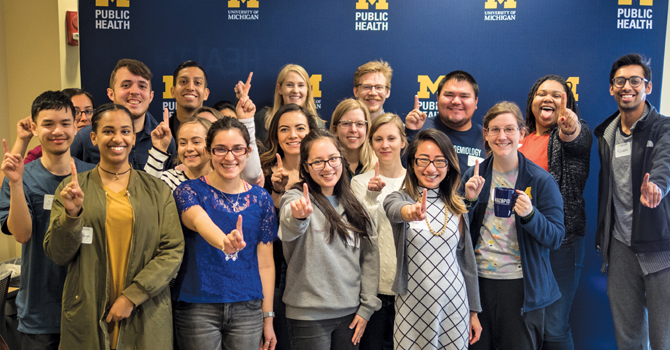Supporting First-Generation Students at Michigan Public Health

Thousands of students at the University of Michigan are among the first generation in their family to attend college. For many of these students, the opportunity to study at a large, prestigious institution like Michigan is both exhilarating and intimidating.
Challenges often begin well before arriving on campus. Without the familial knowledge of college processes and vocabulary that some might take for granted, just getting in and getting ready for day one can be frustrating. "It is difficult to figure out college and financial aid applications," said Allante Moon, a master's student in Health Behavior and Health Education. "These were not part of my collective family knowledge. How much do things cost and when do we apply? How do transportation and meal plans work once I'm on campus? I had to research everything."
"I was not shy about asking questions, but sometimes we didn't know which questions
to ask."
—Chanell Heslop
Campus life can be isolating, with uncertainties around speaking publicly in class, approaching office hours with faculty, and relating to students from different socioeconomic backgrounds. Confidence helps, but again, assumed knowledge can create roadblocks. "I was not shy about asking questions, but sometimes we didn't know which questions to ask," said Chanell Heslop, a master's student in Health Management and Policy, recounting her undergraduate experience at UCLA. "Internships, for example, were something everyone was doing. But no one told me how important they are to building your skill set and your resume. You have to know to ask about internships."
Being first-generation is only one of many identities these students carry with them. Mislael Valentín-Cortés, a master's student in Health Behavior and Health Education and Social Work, connected with both first-generation and international student groups when he departed his native Puerto Rico and arrived in Michigan for graduate school. "When I first got to Michigan, I was unsure what to expect," said Valentín-Cortés. "This sense of unease was exacerbated when Hurricane Maria and Hurricane Irma impacted Puerto Rico shortly after I had left the island. But I found similar-minded people who were facing some of the challenges I was facing. Like me, they were far from home and family and also unsure what to expect."
Part of the learning curve is knowing that a first-generation student group even exists. The university and the School of Public Health help develop, actively support, and promote programming for first-generation students. "We recruit first-generation students, value the resilience and dedication they bring to public health, and support them with a variety of opportunities for networking and support," said Mary Beth Carroll, former Assistant Director of Student Affairs, who works closely with several of the student groups at the school.
The first-gen experience never leaves you."
—Brianna Dumas
The School of Public Health supported the launch last fall of a social group for first-generation students to augment offerings from the campus-wide student organization, such as the annual first-gen symposium and a special graduation ceremony for students and their families. One of those offerings was a session with the university's Counseling and Psychological Services (CAPS) on imposter syndrome, the chronic psychological iteration of self-doubt and fears of inadequacy. "The first-gen experience never leaves you," said Brianna Dumas, master's student in Health Behavior and Health Education. "I still sometimes wonder if I'm a fraud in this wonderful but highly competitive and stratified academic world. The session on imposter syndrome was extremely helpful to me. And the first-gen student community continues to remind me of my unique strengths, such as certain forms of resilience."
Carroll has been delighted with student response and expects programming to grow and evolve. "Students regularly ask for more—more programming and more formal support. They see the benefits of working together to create and build community and are comfortable asking us to support their efforts. I think that's a good thing, and we will support it to the best of our ability."
First-generation programming is one more way Carroll and her team have honored the school's reputation for developing leaders and equipping them with the skills they need to succeed in a collaborative field. "I've continued to ask for things here at Michigan, because that's what I've learned is necessary," said Cook. "But Michigan Public Health truly has everything I was looking for. It nurtures each student's vision for the future of public health and supports its diverse student body with creative, inclusive programming."
"Michigan Public Health acknowledges that first-generation students face unique challenges.
Emphasis is placed on helping us bridge the gap, however we define that gap."
—Mislael Valentín-Cortés
Activities developed for first-generation students can help them understand and express themselves and find communities in which they feel secure even as they experience vulnerability. "The Michigan Public Health community and the entire university acknowledge that first-generation students face certain unique challenges. Emphasis is placed on helping us bridge the gap, however we define that gap," said Valentín-Cortés. "This gives us the freedom to focus on our studies and the important work at hand."
